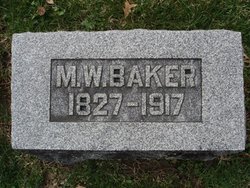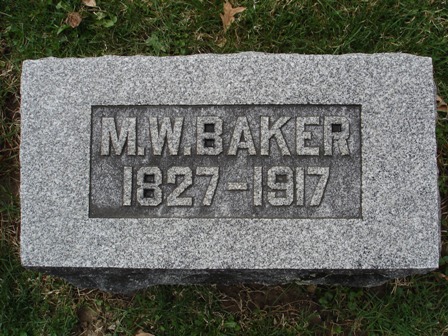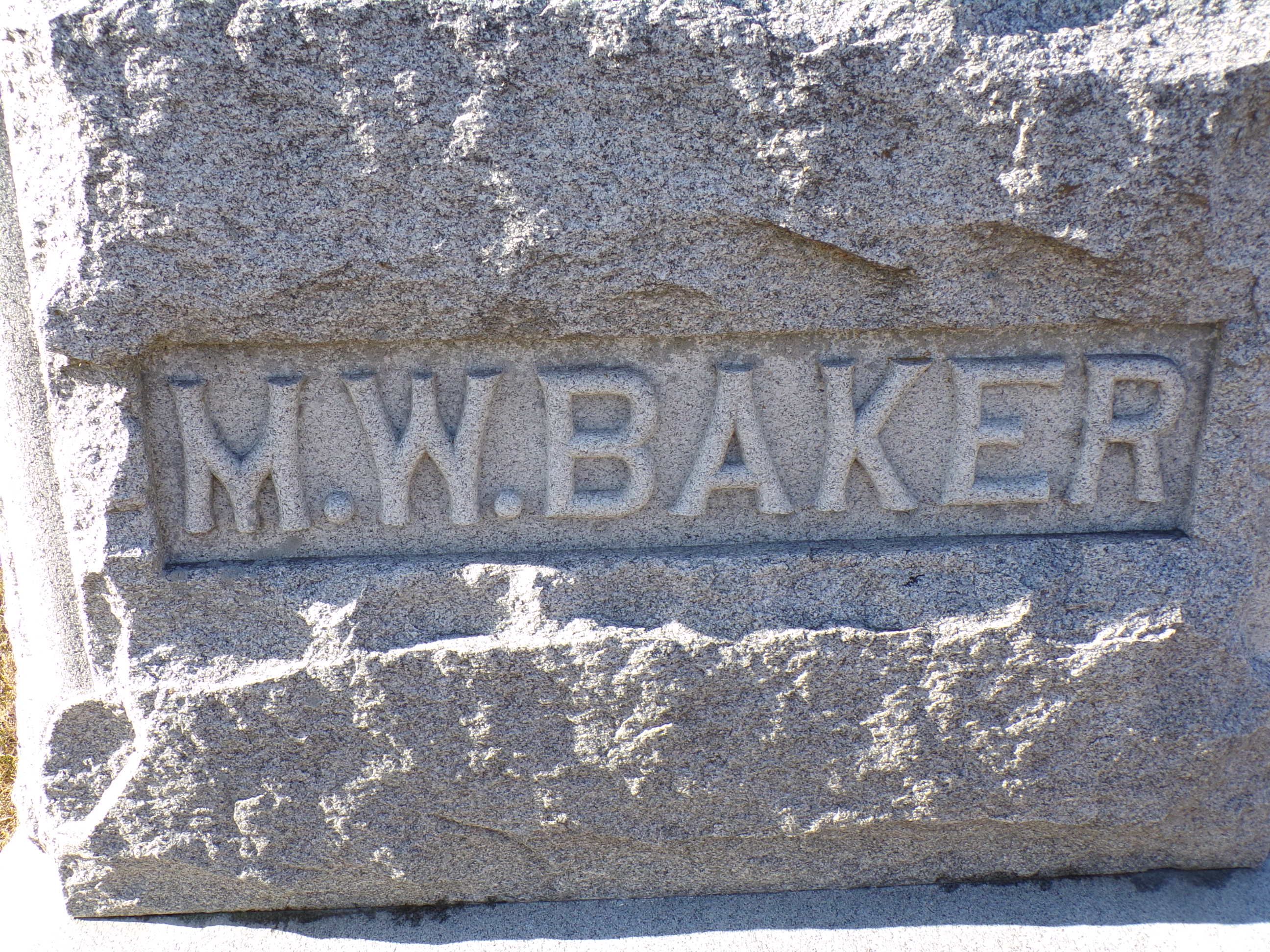GREENSBURG STANDARD
Friday February 8, 1907
THE PIONEERS
Our Oldest Citizens, Who Made This Country What It Is
Extensive Farmer and Stock Dealer, Good Citizen,
Friendly Neighbor and Christian Gentleman
MARSH W. BAKER
Marsh William Baker, who has been a resident of Clay township, this county, since 1847-sixty years-and has an extensive acquaintance, when interviewed by THE STANDARD, modestly spoke of himself, but pointed with pride to his ancestors, who figured prominently in the early history of the country. His grandfather, Daniel Baker, on whose tomb was carved the words, "A Companion of Washington," enacted an important part in the Revolution. Daniel Baker enlisted in a company of grenadiers, of whom not a member was under six feet tall. He was soon afterwards attached to the personal staff of General Washington, and served well as a scout, and as circumstances demanded, he filled the dangerous role of a spy, and like Harvey Birch, the hero of Cooper's famous story "The Spy," won the personal approbation of the commander-in-chief. Mr. Baker relates many of the stories told him by his grandfather, and the listener becomes interested when he hears of how the Hessians in New Jersey plundered the home of the young grenadier, turning his parents out of the house while they ripped open the bed ticks and strewed the feathers in the yard, broke the furniture wantonly, and even shot down the old family milk cow; but the story has a new interest when it is told that the company of grenadiers came on the scene within a few hours and avenged the wrong. Every man of the Hessian marauding company was killed except one officer who hid behind the barn. Young Baker, after having the tip of his ear shot off, rushed upon the officer, seized him by main strength and marched him to Washington headquarters, where he was contrary to his own expectations, not shot, but sent away as a prisoner of war. An incident in the story of his grandfather has a peculiar interest because of a circumstance which happened later. General Washington, on occasion, broke his gold-mounted field glass, and was sadly discomfitted by the accident. His orderly, Daniel Baker, at once undertook to pilot the general through British lines to a silversmith that could repair the field glass, and when it had been done, Washington gave the "boys" who had accompanied him the privilege of looking through the glass into the very camp of Gen. Howe, the British commander. In 1876 Mr. Baker went to the Centennial Exposition at Philadelphia, and on the return trip visited the tomb of Washington at Mount Vernon. There he saw, in the old home of the "father of his country," amongst other relics, a gold mounted field glass--doubtless the one of which his grandfather had spoken, and through which he had counted the buttons on the coats of the British soldiers on that occasion.
Marsh W. Baker was born in Butler county, Ohio, April 2, 1827, and is therefore nearing the end of his seventieth year. His father was Caleb Baker, and his mother was Sarah Williams. Both parents were natives of Westfield, Essex county, New Jersey, a town near the New York line. In 1813 Caleb Baker and Joseph Cory rode horse-back from New Jersey to look at land and stopped in Butler county, Ohio, where they both later located, and where Mr. Baker died, owning five hundred acres of land. Joseph Cory was a brother-in-law of Caleb Baker, having married his sister, Nancy Baker. He was the father of the late James Cory, and therefore the grandfather of Joseph Cory, a well known farmer of Clay township. In 1814 Daniel Baker, the revolutionary hero, moved his family from New Jersey to Ohio, in a wagon, the trip consuming forty days and nights, and he settled on a forty-acre farm, on which he lived until his death. Marsh Baker, the subject of this article, first came to Indiana in 1844. He visited Ed Marshel, who then lived on the farm over-looking the Clifty spring, made famous by Edward Eggleston in his facinating story, "The Hoosier Schoolmaster." Mr. Baker was accompanied by his relatives who were also akin to Mrs. Ed Marsbel, his cousin, Nancy Bowrne, who lives in Greensburg today, on West Washington Street. The ostensible object of the visit was to eat and dry peaches, for which the Milford neighborhood was then noted. In 1845 Mr. Baker's father bought one hundred and eighty-one acres of land in Clay township, near the line of Washington township. This is the present Baker home place. He paid for it $10.50 an acre, but it could not now be purchased for $100 an acre. Baker Cory a brother of James Cory, occupied the farm for three years. Young Marsh Baker came out to look after his father's interests once a year, and by this means he became interested in Indiana and its people-especially some of the people, for in January, 1847, he came to stay, and August 3rd of that year, he was married to Ann Logan, a sister of the late Samuel H. Logan, and from that time to present he has been identified with the interests of Decatur county. They commenced house keeping at once on the home farm, where they have since lived. He early turned his attention to livestock, and by discriminate buying and careful management, has made that a profitable line of business. He remembers vividly some pointers he got at a sale he attended made by Bradley Adkins, on the hill over-looking both Adams and Greensburg, known as the J.D. Pleake farm, now owned by Henry Hodges, and called by him "Westover," but Mr. Baker insists that it should have always been called "Walnut Hill," in recognition of the abundant growth of walnut trees on the place.
To Mr. and Mrs. Baker have been born nine children, of whom four are dead. In the order of their ages they are here mentioned: Clara, wife of Sim Tarkington, now living at Tulare, California; John C., who died at the age of twenty-four: Benjamin Franklin, who lives at Oakland, California: Laura, the wife of Hon. Will R. Pleak, but who has been dead for several years: Samuel L., who has been for sixteen years an attorney-at-law in Minneapolis: David M., who was killed in this city in 1884: Harriet B. and Sadie, both at home, and Marsh, who died in infancy. Mr. Baker has been a successful farmer. He owns four hundred and fifty acres of land in a high state of cultivation, with excellent improvements and a commodious farm residence. He never held office, but says that he served for twenty-two years as deputy school director under the late James Bennett, a neighbor, who held the office and permitted him to look after the duties. Mr. Baker was throughly identified with the public school known as the Baker school, but which has recently been annulled and the school house converted into a dwelling. He is a member of the Presbyterian church of this city, with which he united in 1847, during the pastorate of Rev. Joseph R. Monfort. Mr. Baker is in politics a Republican, though not an offensive partisian. He comes of a family noted for its longevity. His grandfather died at the age of ninety, and his grandmother at the age of ninety-five. Marsh Baker's name is a synonym for good citizen, friendly neighbor and Christian gentleman. His friends are those who know him.
GREENSBURG STANDARD
Friday February 8, 1907
THE PIONEERS
Our Oldest Citizens, Who Made This Country What It Is
Extensive Farmer and Stock Dealer, Good Citizen,
Friendly Neighbor and Christian Gentleman
MARSH W. BAKER
Marsh William Baker, who has been a resident of Clay township, this county, since 1847-sixty years-and has an extensive acquaintance, when interviewed by THE STANDARD, modestly spoke of himself, but pointed with pride to his ancestors, who figured prominently in the early history of the country. His grandfather, Daniel Baker, on whose tomb was carved the words, "A Companion of Washington," enacted an important part in the Revolution. Daniel Baker enlisted in a company of grenadiers, of whom not a member was under six feet tall. He was soon afterwards attached to the personal staff of General Washington, and served well as a scout, and as circumstances demanded, he filled the dangerous role of a spy, and like Harvey Birch, the hero of Cooper's famous story "The Spy," won the personal approbation of the commander-in-chief. Mr. Baker relates many of the stories told him by his grandfather, and the listener becomes interested when he hears of how the Hessians in New Jersey plundered the home of the young grenadier, turning his parents out of the house while they ripped open the bed ticks and strewed the feathers in the yard, broke the furniture wantonly, and even shot down the old family milk cow; but the story has a new interest when it is told that the company of grenadiers came on the scene within a few hours and avenged the wrong. Every man of the Hessian marauding company was killed except one officer who hid behind the barn. Young Baker, after having the tip of his ear shot off, rushed upon the officer, seized him by main strength and marched him to Washington headquarters, where he was contrary to his own expectations, not shot, but sent away as a prisoner of war. An incident in the story of his grandfather has a peculiar interest because of a circumstance which happened later. General Washington, on occasion, broke his gold-mounted field glass, and was sadly discomfitted by the accident. His orderly, Daniel Baker, at once undertook to pilot the general through British lines to a silversmith that could repair the field glass, and when it had been done, Washington gave the "boys" who had accompanied him the privilege of looking through the glass into the very camp of Gen. Howe, the British commander. In 1876 Mr. Baker went to the Centennial Exposition at Philadelphia, and on the return trip visited the tomb of Washington at Mount Vernon. There he saw, in the old home of the "father of his country," amongst other relics, a gold mounted field glass--doubtless the one of which his grandfather had spoken, and through which he had counted the buttons on the coats of the British soldiers on that occasion.
Marsh W. Baker was born in Butler county, Ohio, April 2, 1827, and is therefore nearing the end of his seventieth year. His father was Caleb Baker, and his mother was Sarah Williams. Both parents were natives of Westfield, Essex county, New Jersey, a town near the New York line. In 1813 Caleb Baker and Joseph Cory rode horse-back from New Jersey to look at land and stopped in Butler county, Ohio, where they both later located, and where Mr. Baker died, owning five hundred acres of land. Joseph Cory was a brother-in-law of Caleb Baker, having married his sister, Nancy Baker. He was the father of the late James Cory, and therefore the grandfather of Joseph Cory, a well known farmer of Clay township. In 1814 Daniel Baker, the revolutionary hero, moved his family from New Jersey to Ohio, in a wagon, the trip consuming forty days and nights, and he settled on a forty-acre farm, on which he lived until his death. Marsh Baker, the subject of this article, first came to Indiana in 1844. He visited Ed Marshel, who then lived on the farm over-looking the Clifty spring, made famous by Edward Eggleston in his facinating story, "The Hoosier Schoolmaster." Mr. Baker was accompanied by his relatives who were also akin to Mrs. Ed Marsbel, his cousin, Nancy Bowrne, who lives in Greensburg today, on West Washington Street. The ostensible object of the visit was to eat and dry peaches, for which the Milford neighborhood was then noted. In 1845 Mr. Baker's father bought one hundred and eighty-one acres of land in Clay township, near the line of Washington township. This is the present Baker home place. He paid for it $10.50 an acre, but it could not now be purchased for $100 an acre. Baker Cory a brother of James Cory, occupied the farm for three years. Young Marsh Baker came out to look after his father's interests once a year, and by this means he became interested in Indiana and its people-especially some of the people, for in January, 1847, he came to stay, and August 3rd of that year, he was married to Ann Logan, a sister of the late Samuel H. Logan, and from that time to present he has been identified with the interests of Decatur county. They commenced house keeping at once on the home farm, where they have since lived. He early turned his attention to livestock, and by discriminate buying and careful management, has made that a profitable line of business. He remembers vividly some pointers he got at a sale he attended made by Bradley Adkins, on the hill over-looking both Adams and Greensburg, known as the J.D. Pleake farm, now owned by Henry Hodges, and called by him "Westover," but Mr. Baker insists that it should have always been called "Walnut Hill," in recognition of the abundant growth of walnut trees on the place.
To Mr. and Mrs. Baker have been born nine children, of whom four are dead. In the order of their ages they are here mentioned: Clara, wife of Sim Tarkington, now living at Tulare, California; John C., who died at the age of twenty-four: Benjamin Franklin, who lives at Oakland, California: Laura, the wife of Hon. Will R. Pleak, but who has been dead for several years: Samuel L., who has been for sixteen years an attorney-at-law in Minneapolis: David M., who was killed in this city in 1884: Harriet B. and Sadie, both at home, and Marsh, who died in infancy. Mr. Baker has been a successful farmer. He owns four hundred and fifty acres of land in a high state of cultivation, with excellent improvements and a commodious farm residence. He never held office, but says that he served for twenty-two years as deputy school director under the late James Bennett, a neighbor, who held the office and permitted him to look after the duties. Mr. Baker was throughly identified with the public school known as the Baker school, but which has recently been annulled and the school house converted into a dwelling. He is a member of the Presbyterian church of this city, with which he united in 1847, during the pastorate of Rev. Joseph R. Monfort. Mr. Baker is in politics a Republican, though not an offensive partisian. He comes of a family noted for its longevity. His grandfather died at the age of ninety, and his grandmother at the age of ninety-five. Marsh Baker's name is a synonym for good citizen, friendly neighbor and Christian gentleman. His friends are those who know him.
Family Members
Sponsored by Ancestry
Advertisement
Explore more
Sponsored by Ancestry
Advertisement


















